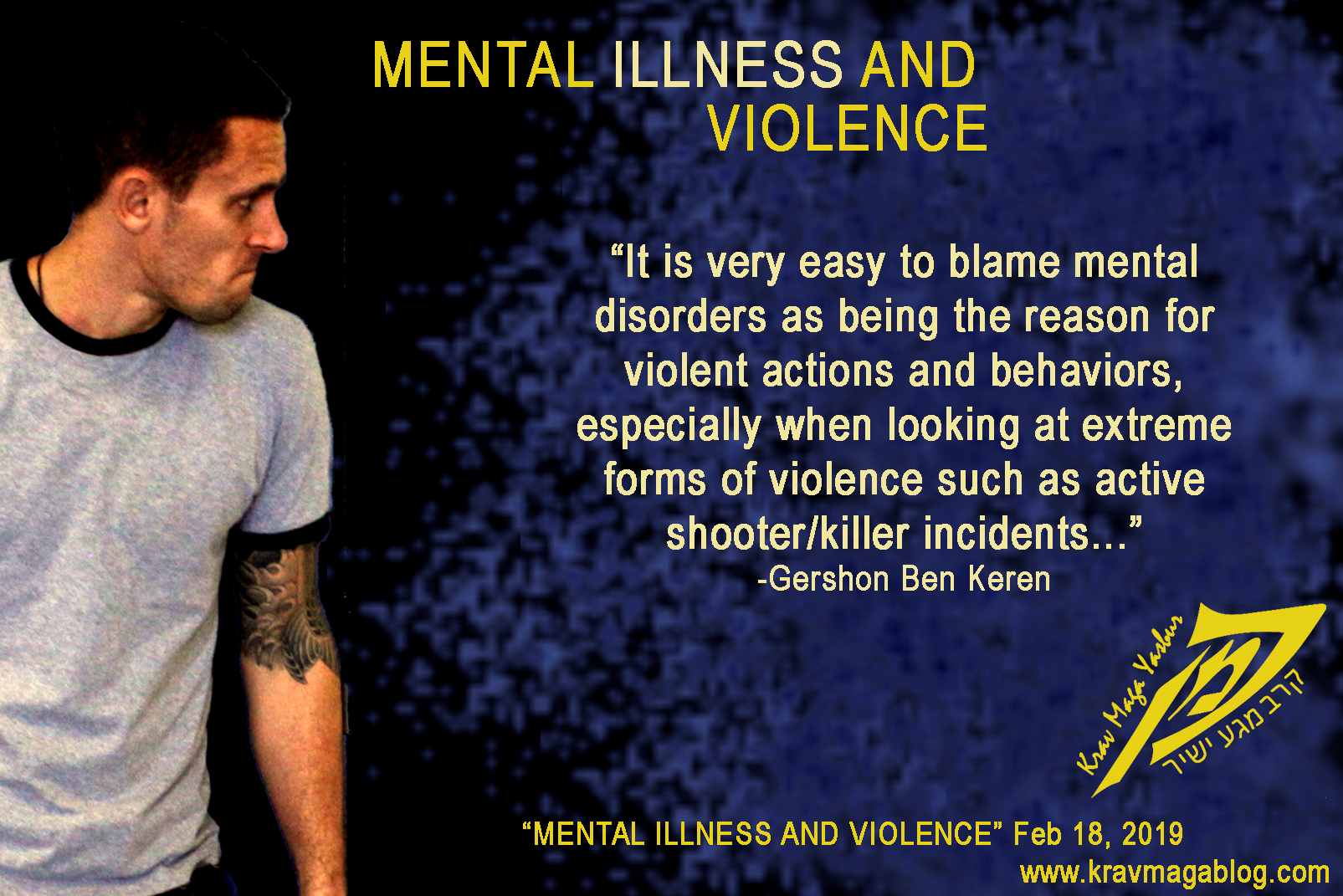Recently, I’ve been doing a fair amount of work surrounding risk prediction, and mental illness. There is a lot of confusion and misunderstanding concerning mental disorders and violence, with many people having an unnecessary fear of those who suffer from such illnesses. This is not to say that certain disorders, such as schizophrenia, don’t have an association with violent behavior, however the majority of sufferers don’t ever engage in violence, and it may be that other non-clinical factors – that may have been present before the disorder developed – are more important when predicting future physical aggression. In this article, I want to look at the role mental illness, may have in violent offending, and why it might not always be as significant in explaining violence as other factors. This is not to dismiss the importance of clinical disorders, but to put them in some context where violent offending is concerned.
Mental health symptoms are traditionally divided into two groups: Neurotic symptoms and Psychotic symptoms. Neuroses are symptoms that can be considered as extreme forms of normal emotional experiences e.g. depression, anxiety, and panic attacks, etc. They can be seen as extreme “exaggerations” of commonly experienced emotions, such as sadness i.e. all of s have experienced sadness at some time, or feelings of low self-esteem, however only a smaller number of us have suffered from clinical depression, where these thoughts and feelings are magnified to the point where we feel we can’t do anything, or have suicidal ideation, etc. Neuroses can lead to violent offending, however somebody who is suffering from depression or anxiety is more likely to withdraw from society than engage with it, and so the risk of conflict is often reduced. A person suffering from Psychotic symptoms has an altered and different perception of the world, where they might experience delusions, hallucinations or paranoia – where they see and experience things which aren’t really there or interpret other people’s actions and behaviors differently to how they’re meant/intended. Psychotic episodes, can see people smelling, hearing, and seeing things that aren’t even there. Although this altered view of the world can lead to a person feeling threatened, where no danger exists, or believing that they need to act violently against someone for the greater good of society, for the most part this isn’t the case; and it is usually more likely to happen when coupled with substance abuse: drugs and/or alcohol, etc.
Although these clinical factors may play a part in violent offending, equally – and perhaps more – important are dispositional factors. It is easy to define somebody by their mental disorder e.g. they are a schizophrenic, and forget that they also have a personality, which makes them an individual. As stated earlier, the majority of those with schizophrenia don’t engage in violent acts, however aggression and violence are risk factors associated with this illness. If a person is already predisposed to anger, this predisposition is perhaps more likely to lead towards violent behavior in somebody suffering from schizophrenia, than someone who doesn’t have this disposition. People who have found that anger is a successful strategy/tactic when interacting with others – regardless of whether they have a mental illness/disorder – are more likely to use anger to achieve their goals, than those who have experience of using other social tools successfully. It is also worth noting that there is a difference between transient anger and permanent anger e.g. a psychotic episode which sees an expression of “transient” anger, is very different to somebody whose personality is permanently, and largely, defined by anger. It is easy to forget that clinical factors work with dispositional factors such as anger, and that these underlying personality traits may be more important in predicting violent behavior.
Contextual factors also play a part e.g. if an individual suffering from a mental illness, is hungry, homeless, and in pain/discomfort, ceterus paribus, they are more likely to act and behave violently than somebody who is comfortable and who feels a degree/level of control over their life. A person with a mental illness, may have no thoughts/ideas of acting violently until a crisis event occurs, such as losing their home, or coming to the end of a program they are on, etc. Change and uncertainty affect us all, and some of us respond to such things with aggression and violence e.g. we may feel that life, society etc. has treated us unfairly, and that we are justified in reacting violently to the changing events we experience. If we suffer from a psychosis, we may interpret changes in our lives, in a more extreme form; somebody suffering from paranoia, may interpret the loss of their home, as a conspiracy against them, with the event taking on a certain significance, that it doesn’t really have e.g. they were evicted because they were unable to manage their rent/mortgage payments, etc. Until that point, they may have been able to function and live with their disorder, however this event pushes them over the edge.
It is very easy to blame mental disorders as being the reason for violent actions and behaviors, especially when looking at extreme forms of violence such as active shooter/killer incidents – and in certain instances this is the case e.g. Adam Lanza, Kip Kinkel, etc. However, it is an extremely simplistic way of understanding such incidents; obviously somebody who engages on such killing sprees, is going to be suffering from mental health issues, however few are actually suffering from what would be clinically diagnosed disorders, and where they are, dispositional factors such as a preference for using anger and rage as methods of social interaction, or contextual events, such as a personal crisis, or access to a weapon, etc., may be more important than the illness itself in predicting such violent behaviors. Another important contextual factor is that of who the individual associates with – it is unlikely that Dylan Klebold, a meek, shy individual who suffered from depression, would have expressed himself by killing his classmates at Columbine, if it wasn’t for the psychopathic influence of Eric Harris. When considering the role of mental illness in violent offending, it is only one part of a complex jigsaw e.g. it may be easier to medically treat a clinical disorder, such as schizophrenia, than change/alter the underlying personality of the individual.
Share:

Gershon Ben Keren
2.8K FollowersGershon Ben Keren, is a criminologist, security consultant and Krav Maga Instructor (5th Degree Black Belt) who completed his instructor training in Israel. He has written three books on Krav Maga and was a 2010 inductee into the Museum of Israeli Martial Arts.
Click here to learn more.

